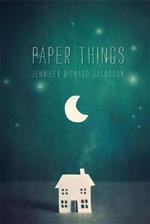 Jennifer Richard Jacobson says she doesn’t look for heavy topics on which to base her books, but she finds them nonetheless. Whether it’s homelessness or just not fitting in, her characters have depth and realism. Inspired by reading great works before embarking on her writing career, Jacobson will share at the ILA 2015 Conference how one book can appeal across any grade in a school and unite the student body and staff.
Jennifer Richard Jacobson says she doesn’t look for heavy topics on which to base her books, but she finds them nonetheless. Whether it’s homelessness or just not fitting in, her characters have depth and realism. Inspired by reading great works before embarking on her writing career, Jacobson will share at the ILA 2015 Conference how one book can appeal across any grade in a school and unite the student body and staff.
You've written across all ages, from children's books to YA novels and resources for teachers. Do you have a favorite group to write for?
I enjoy writing for all ages. I adore the lap experience with the picture book reader, the sense of humor of the chapter book reader, the ability to explore more mature themes with young adults. However, if told that I had to pick one and only one, I would choose middle grade novels in the same 9–14 age pocket as Small as an Elephant and Paper Things. Middle-grade readers swing between genuine innocence and piercing wisdom, and I love developing characters who do the same.
How does your writing process differ depending on the age group you're writing for?
I try hard to look at the world through the eyes of my reader. So sometimes I am 4, sometimes 6, but most often 12.
Paper Things crosses some pretty tough subject matter, including homelessness. How did you choose that theme?
I don’t set out to write about tough themes, but I do end up there!
 When beginning a new story, I combine terrains I wish to explore. Like Ari in Paper Things, I was marginalized during my tween years. And like Ari, I constructed homes and families from catalog cutouts. I thought it would be interesting to revisit those feelings of isolation, of losing ground in school, of being left behind.
When beginning a new story, I combine terrains I wish to explore. Like Ari in Paper Things, I was marginalized during my tween years. And like Ari, I constructed homes and families from catalog cutouts. I thought it would be interesting to revisit those feelings of isolation, of losing ground in school, of being left behind.
At the same time I was imagining Ari, I was becoming increasingly concerned about young adults who “age out” of foster care and lack the support needed to transition into the adult world. I decided to give Ari an older brother who chooses to leave their guardian and take his little sister with him. Unfortunately, Gage didn’t secure a steady job and apartment before they left home.
What about being a teacher made you adept at writing for children?
I work in high poverty schools and meet so many children with a strong desire to achieve despite incredible hardship. The resilience of these children never ceases to amaze me. Their stories inspire my own.
You said you learned to write through a year of reading you did for a job. Is there one book you think is a must-read for an aspiring writer?
Charlotte’s Web. It demonstrates some of the finest writing in children’s literature—and talk about tough themes! This story deals with the pending slaughter of the main character and the death of his best friend. For a moment, consider the gravity of the first sentence: “Where’s Papa going with that ax?”
One of the reasons we all love this book is that it respects the reader. It allows us to ponder the vagaries of life and death, love and loyalty, through the eyes of an 8-year-old and a young pig. What more could anyone want from a book?
Jacobson will co-present with literacy coach Jennifer Allen Saturday, July 18 at the ILA 2015 Conference in St. Louis. Entitled “Creating Unity: How the One Book One School Experience Helps All Readers Feel Like Insiders,” the session will be based on a One Book One School program conducted at the Albert Hall School in 2014. Visit the ILA 2015 Conference website for more information or to register.